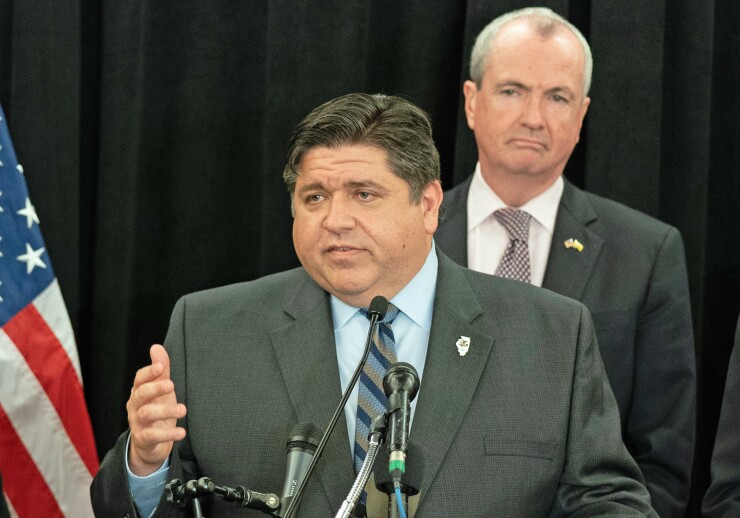J.B. Pritzker was able to get Illinois lawmakers to sign off on his plan for graduated state income tax rates. Now the first-year governor has to convince the state's voters.
The House’s party-line vote approving

The Senate approved the plan on May 1. The measure does not require the governor’s signature.
“This monumental vote in the General Assembly means that voters will have the right to decide our system for themselves in November 2020,” Pritzker, a Democrat, said after the vote. The governor has not announced any backup plans to address the state's fiscal woes should the public vote fail.
Previous votes on the tax-rate change along with strong inflows and a thirst for high-yield paper helped trim the state’s still material yield penalties, but market observers did not see an impact Tuesday as the market digested the Memorial Day vote.
“Illinois GO spreads have compressed by 20-25 basis points since the beginning of May in general as investors reach for yield,” said Daniel Berger, senior market strategist at Municipal Market Data-Refinitiv. One trade Tuesday of a 2027 bond at a 137 bp spread to the MMD AAA benchmark was in line with trades last week.
“Final passage of Illinois state amendment on progressive income did not affect Illinois state trade activity this morning,” said Edward Lee, strategist at IHS Markit, who observed trades of a 2027 and 2030 bonds at a 140 bp and 133 bp spread, respectively. Both were on par with trades last week. The spreads remain the widest among U.S. states.
Several slightly different rate structures proposed by the governor and the Senate would raise between $3.4 billion and $3.5 billion annually by lifting the top individual rate to nearly 8% from the current flat rate of 4.95% and the corporate rate to nearly 8% from 7%.
Pritzker is proposing to raise taxes on the top 3% of state earners with the remainder either paying the same rate they do today or a lower one. A House committee approved a structure along the lines of the Senate's plan but it had not come up for a floor vote at press time.
With what was considered one of the toughest votes of the session out of the way, lawmakers can focus on consideration of a fiscal 2020 budget, a $41 billion six-year capital budget, and legislation that would legalize recreational marijuana and implement sports betting.
The 2020 budget proposal relies on $170 million in license fees on recreational cannabis and $212 million from sports betting licenses. The sports betting measure is now being tied to a larger expansion of gambling that includes new casino licenses. The regular session ends Friday. After that a three-fifths supermajority is required during any special session for legislation to take effect immediately.
The House passed the tax resolution on a 73-44 vote, clearing the three-fifths supermajority of 71 needed for approval. Democratic leaders won over several Democrats who had been skeptical of the change, clearing the way for the vote that came only after all 44 GOP members who cast a no vote spoke against it during the floor debate that lasted more than three hours Monday. One Democrat was not present.
The GOP warns that moving to a progressive structure will open the floodgates to future hikes that impact the middle class. Democrats counter that it’s hard to pass a tax hike whether the state imposes a progressive or flat tax.
“This is more of the same, taxes, taxes and more taxes…this bill will kill jobs and drive more people out of the state,” said Rep. David McSweeney, R-Barrington Hills.
“Let’s make no mistake,” said House Minority Leader Jim Durkin, R-Western Springs, who accused the governor of horse-trading to win over votes. “Today’s vote is the end result of the Illinois Democrats’ historical, ravenous, irresponsible budgeting and spending.”
Backers argued the shift provides the best means to solve the state’s more than $3 billion structural budget gap and put it on a path to tackle its more than $6 billion backlog of unpaid bills and $133.7 billion of unfunded pension liabilities.
“This is an opportunity to fix the problems of Illinois,” said the amendment’s House sponsor, Rep. Robert Martwick, D-Chicago. Backers say it’s also the best of three proposed options. The other two involve either a 20% hike in the flat tax or a 15% cut in state services.
To pass muster, either 60% of those voting on the question on the ballot or the majority of those casting a ballot in the election must approve it.
To help win over skeptical Democrats, leaders and the governor announced creation of a Property Tax Relief Tax Force that will be charged with issuing a report by the end of the year on ideas for providing short-and-long term relief.
Pritzker’s attempts to sell the change extended to bond rating agencies and investors during a trip to New York ahead of a spring bond sale. “My proposed fiscal 2020 budget serves as a bridge to a stable fiscal future,” he told investors.
Moody's Investors Service rates Illinois Baa3 and S&P Global Ratings assigns a BBB-minus rating, both with stable outlooks. Fitch Ratings assigns its BBB with a negative outlook. The additional revenue could help, but not solve, the state’s fiscal ills, but the proposal is generally views by analysts as a positive.





